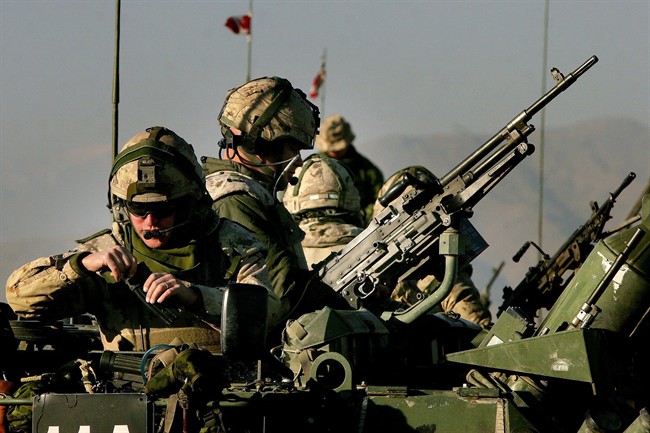Three-quarters of Canadian Forces personnel are overweight or obese, a new report suggests, although the authors caution those numbers may be skewed by soldiers with high muscle mass.

The figures are contained in the latest edition of the department’s Health and Lifestyle Information Survey (HLIS), which covers the 2013/2014 year.
“Based on self-reported height and weight, 49 per cent of personnel were classified as overweight and another 25 per cent were classified as obese,” the report reads.
Among the overweight group, high muscle mass “may account for a proportion” of the members who found themselves in that category.
Being overweight based on the body mass index (BMI) scale means you’re heavier than recommended for your height, but many soldiers may simply be very muscular. The BMI of a very muscular person could easily be in the overweight/obese range even though their body has very little fat.
WATCH: Canadian Forces see sharp increase in reports of inappropriate sexual behaviour over last year

The same can’t be said for the obese, or morbidly obese, personnel who were surveyed.

Get breaking National news
“The vast majority of males and females with an obese BMI perceived themselves as carrying excess body fat,” says the report. “High muscle mass could, therefore, explain some cases of overweightness in males, but is unlikely to account for many cases of obesity in either males or females.”
Overall, the proportion of obese Canadian Forces members has increased nearly five per cent since 2004. The proportion of people classified as morbidly obese also jumped, from 3.6 to six per cent, in the same time span.
The HLIS was mailed out to 4,312 Canadian Forces personnel in 2013 who had been randomly selected from an overall population of 56,574. The data were then weighted to reflect the age, sex, and rank distribution of the 2013 regular force personnel.
Less smoking, but not enough veggies
The report contained some good news when it came to smoking and physical activity. The number of smokers decreased from 23 per cent in 2008-2009 to 17.6 per cent in 2013-2014, and the proportion of physically active members increased from 78.7 per cent to 85.2 per cent in the same period.
But when it comes to diet, the authors again found themselves facing bad news.
READ MORE: Royal Canadian Air Force gives bird’s-eye view of training mission
A full 83.3 per cent of Regular Force personnel reported that their eating habits were good, very good, or excellent, the report notes.
“However, only 28.7 per cent of personnel ate vegetables and fruits more than six times per day … Furthermore, 42.4 per cent of Regular Force personnel had skipped breakfast at least twice in the last week, and 52.2 per cent of personnel underestimated Canada’s Food Guide recommendations for vegetable and fruit intake.”
Those numbers suggest “a notable nutritional knowledge gap” in Canada’s military, the report concludes.
Binge drinking still a problem
The HLIS also examined issues like excessive drinking and mental health problems.
The report states that while there’s been little change in the percentage of personnel engaged in harmful drinking over the past few years, “a substantial proportion of personnel are still engaged in high risk/harmful drinking behaviours including binge drinking.”
The authors suggest “continued efforts” to promote responsible drinking.
WATCH: Government needs to provide mental health education to soldiers, says veteran
The Alcohol Use Disorders Identification Test (AUDIT), which was included as part of the broader survey, showed that 20 per cent (or one-fifth) of personnel have “harmful or hazardous drinking behaviours.” That’s up from 15.7 per cent in 2004
Around 17.1 per cent of Regular Force personnel sought help for a mental health problem in the 12 months before filling out the survey, which was slightly more than in 2004. Another 15 per cent said they felt the need for mental health care, but did not receive it over the past year.








Comments